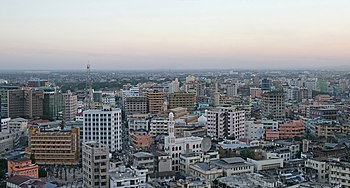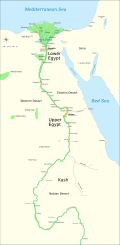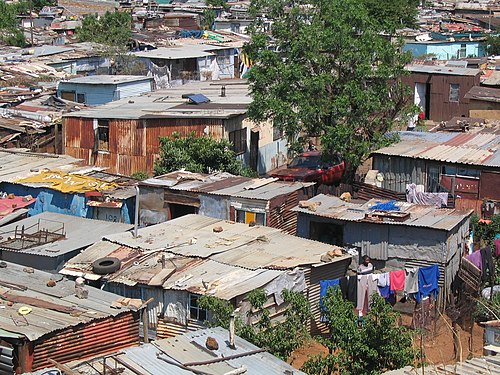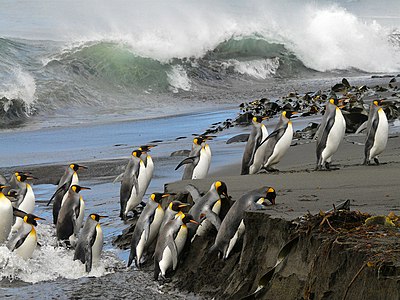Portal:Africa



Africa is the world's second-largest and second-most populous continent after Asia. At about 30.3 million km2 (11.7 million square miles) including adjacent islands, it covers 20% of Earth's land area and 6% of its total surface area. With nearly 1.4 billion people as of 2021, it accounts for about 18% of the world's human population. Africa's population is the youngest among all the continents; the median age in 2012 was 19.7, when the worldwide median age was 30.4. Despite a wide range of natural resources, Africa is the least wealthy continent per capita and second-least wealthy by total wealth, ahead of Oceania. Scholars have attributed this to different factors including geography, climate, corruption, colonialism, the Cold War, and neocolonialism. Despite this low concentration of wealth, recent economic expansion and a large and young population make Africa an important economic market in the broader global context. Africa has a large quantity of natural resources and food resources, including diamonds, sugar, salt, gold, iron, cobalt, uranium, copper, bauxite, silver, petroleum, natural gas, cocoa beans, and.
Africa straddles the equator and the prime meridian. It is the only continent to stretch from the northern temperate to the southern temperate zones. The majority of the continent and its countries are in the Northern Hemisphere, with a substantial portion and a number of countries in the Southern Hemisphere. Most of the continent lies in the tropics, except for a large part of Western Sahara, Algeria, Libya and Egypt, the northern tip of Mauritania, and the entire territories of Morocco, Ceuta, Melilla, and Tunisia, which in turn are located above the tropic of Cancer, in the northern temperate zone. In the other extreme of the continent, southern Namibia, southern Botswana, great parts of South Africa, the entire territories of Lesotho and Eswatini and the southern tips of Mozambique and Madagascar are located below the tropic of Capricorn, in the southern temperate zone.
Africa is highly biodiverse; it is the continent with the largest number of megafauna species, as it was least affected by the extinction of the Pleistocene megafauna. However, Africa also is heavily affected by a wide range of environmental issues, including desertification, deforestation, water scarcity, and pollution. These entrenched environmental concerns are expected to worsen as climate change impacts Africa. The UN Intergovernmental Panel on Climate Change has identified Africa as the continent most vulnerable to climate change.
The history of Africa is long, complex, and varied, and has often been under-appreciated by the global historical community. In African societies, the historical process is largely a communal one, with eyewitness accounts, hearsay, and reminiscences, and occasionally visions, dreams, and hallucinations, crafted into oral traditions and preserved orally. Truth is generally viewed as relativist. Africa, particularly Eastern Africa, is widely accepted to be the place of origin of humans and the Hominidae clade, also known as the great apes. The earliest hominids and their ancestors have been dated to around 7 million years ago, including Sahelanthropus, Australopithecus africanus, A. afarensis, Homo erectus, H. habilis and H. ergaster, the earliest Homo sapiens (modern human) remains, found in Ethiopia, South Africa, and Morocco, date to circa 233,000, 259,000, and 300,000 years ago, respectively, and Homo sapiens is believed to have originated in Africa around 350,000–260,000 years ago. Africa is also considered by anthropologists to be the most genetically diverse continent as a result of being the longest inhabited. (Full article...)
Selected article –
Laetoli is a pre-historic site located in Enduleni ward of Ngorongoro District in Arusha Region, Tanzania. The site is dated to the Plio-Pleistocene and famous for its Hominina footprints, preserved in volcanic ash. The site of the Laetoli footprints (Site G) is located 45 km south of Olduvai gorge. The location and tracks were discovered by archaeologist Mary Leakey and her team in 1976, and were excavated by 1978. Based on analysis of the footfall impressions "The Laetoli Footprints" provided convincing evidence for the theory of bipedalism in Pliocene Hominina and received significant recognition by scientists and the public. Since 1998, paleontological expeditions have continued under the leadership of Amandus Kwekason of the National Museum of Tanzania and Terry Harrison of New York University, leading to the recovery of more than a dozen new Hominina finds, as well as a comprehensive reconstruction of the paleoecology. The site is a registered National Historic Sites of Tanzania.
Dated to 3.7 million years ago, they were the oldest known evidence of hominin bipedalism at that time. Subsequently, older Ardipithecus ramidus fossils were found with features that suggest bipedalism. With the footprints there were other discoveries excavated at Laetoli including Hominina and animal skeletal remains. Analysis of the footprints and skeletal structure showed clear evidence that bipedalism preceded enlarged brains in Hominina. At a species level, the identity of the Hominina who made the trace is difficult to construe precisely; Australopithecus afarensis is the species most commonly proposed. (Full article...)Featured pictures –
Did you know (auto-generated) -

- ... that the lenient sentencing of two Europeans convicted in 1918 after the death of a black man in the East Africa Protectorate led to inquiries from the British Colonial Office?
- ... that after the 1999 Tempe military base shooting, the Pan African Congress demanded a military funeral for the perpetrator?
- ... that after Benjamin Moloise's execution, the extremist group Direct Action bombed two Paris companies linked to South Africa in protest?
- ... that South African anti-apartheid activist Ebrahim Ismail Ebrahim confused warders at the Robben Island maximum security prison by playing Bollywood music?
- ... that Charles Larson's The Emergence of African Fiction was an early attempt to get to an "African aesthetic", but in the eyes of critics fell short and implicitly employed European standards?
- ... that the growth of Christianity in 20th-century Africa has been termed the "fourth great age of Christian expansion"?
Categories
Selected biography –
Evelyn Ntoko Mase (18 May 1922 – 30 April 2004), later named Evelyn Rakeepile, was the first wife of the South African anti-apartheid activist and the future president Nelson Mandela, to whom she was married from 1944 to 1958. Mase was a nurse by profession.
Born in Engcobo, Transkei, Mase was orphaned as a child. She moved to Johannesburg to train as a nurse, and there met and married Mandela. Living together in Soweto, they raised four children, three of whom—Thembekile, Makgatho, and Makaziwe—survived into adulthood. She trained to be a midwife while working as a nurse. In the 1950s, her relationship with Mandela became strained. He was becoming increasingly involved in the African National Congress and its campaign against apartheid; Mase eschewed politics and became a Jehovah's Witness. She also accused him of adultery with several women, an accusation corroborated by later biographies, and of being physically abusive, something he always denied. They separated in 1956. She initially filed for divorce, but did not go through with the legal proceedings. In 1958, Mandela, who was hoping to marry Winnie Madikizela, obtained an uncontested divorce from Mase. (Full article...)Selected country –
 |
 |
|

| ||
Cape Verde, officially the Republic of Cape Verde (Portuguese: Cabo Verde, Portuguese pronunciation: [ˈkabu ˈveɾdɨ]), is a republic located on an archipelago in the Macaronesia ecoregion of the North Atlantic Ocean, off the western coast of Africa. The previously uninhabited islands were discovered and colonized by the Portuguese in the fifteenth century. The country is named after Cap Vert (meaning Green Cape) in Senegal, the westernmost point of continental Africa. It achieved independence from Portugal in 1975 after a long armed struggle in the jungles of Guinea-Bissau.
The politics of Cape Verde takes place in a framework of a parliamentary representative democratic republic, whereby the Prime Minister of Cape Verde is the head of government, and of a multi-party system. Executive power is held by the government. Legislative power is vested in both the government and the National Assembly. The Judiciary is independent of the executive and the legislature. (Read more...)
Selected city –
Enugu (/eɪˈnuːɡuː/ ay-NOO-goo; Igbo: Enugwụ) is the capital city of Enugu State in Nigeria. It is located inland in the Southeastern part of Nigeria. According to the 2006 census, the city had a population of 820,000.
The name Enugu is derived from the two Igbo words Enụ ụgwụ, meaning "hill top", denoting the city's hilly geography. Enugu acquired township status in 1917 and was called Enugwu-Ngwo. Because of its rapid expansion towards areas owned by other indigenous communities, the city was renamed Enugu in 1928. Since the 17th century the location of present-day Enugu has been inhabited by the Ngwo and Nike (/niːˈkeɪ/ nee-KAY) subgroups of the Igbo people. (Full article...)In the news
- 12 February 2024 –
- Two boats collide on the Congo River near Kinshasa, Democratic Republic of the Congo; with the death toll remains unclear. (AP)
- 11 February 2024 – 2023 Africa Cup of Nations
- In association football, hosts Ivory Coast win their third Africa Cup of Nations by defeating Nigeria 2–1 in the final. Sébastien Haller scores the winning goal in the 81st minute. (The Guardian)
- 10 February 2024 – Somali civil war
- Four Emirati soldiers and a Bahraini military officer are killed, while ten other people are injured, when a soldier opens fire at a military base in Mogadishu, Somalia, before being killed in the ensuing shootout. Al-Shabaab claims responsibility. (AP)
- 10 February 2024 –
- A Eurocopter EC130 helicopter crashes near Nipton, California, United States, killing all the six people on board, including Nigerian banker Herbert Wigwe. (CBS News)
- 10 February 2024 – 2023–2024 Senegalese protests
- Violent protests occur in Senegal following an announcement by President Macky Sall that presidential elections have been delayed from February 25 to December 15. (Sky News)
- 9 February 2024 –
- At least 18 people are killed during a collision between a bus and a truck on a road in Kinshasa, Democratic Republic of the Congo. (AP)
Updated: 16:33, 14 February 2024
General images -
Africa topics
More did you know –
- ... that Safi Faye's 1975 film Kaddu Beykat was the first commercially distributed feature film made by a Sub-Saharan African woman?
- ... that legendary princess Yennenga, the "mother" of the Mossi people, was such a great warrior that her father refused to allow her to marry?
- ... that Safi Faye is a Senegalese film director whose work is better known in Europe than in her native Africa?
- ...that Mohamed Camara's 1997 film Dakan was the first West African film to explore homosexuality?
Related portals
Major Religions in Africa
North Africa
West Africa
Central Africa
East Africa
Southern Africa
Associated Wikimedia
The following Wikimedia Foundation sister projects provide more on this subject:
-
Commons
Free media repository -
Wikibooks
Free textbooks and manuals -
Wikidata
Free knowledge base -
Wikinews
Free-content news -
Wikiquote
Collection of quotations -
Wikisource
Free-content library -
Wikispecies
Directory of species -
Wikiversity
Free learning tools -
Wikivoyage
Free travel guide -
Wiktionary
Dictionary and thesaurus

























































































